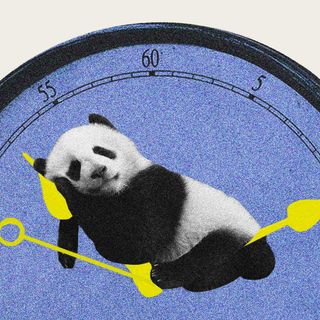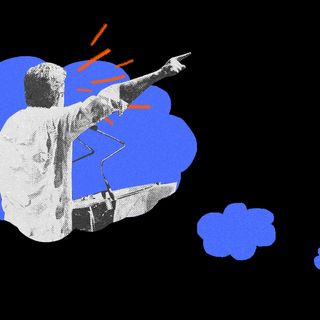
How People’s Dissatisfaction With Their Own Bodies Shapes Their Judgement of Others’
“[The] more emotional distress you feel about your own body, the smaller somebody in body size has to be for you to describe them [as] overweight.”

What we think of our own bodies impacts how we judge those of others, according to a new study. In other words, a person with a negative perception of their body might be more likely to find someone “fat,” irrespective of whether or not they’re indeed overweight.
Published in the journal Frontiers in Psychology, the findings suggest that the more we internalize cultural stereotypes about our appearances, the more likely we are to perpetuate them. This means that a person who is bullied in school for being overweight may not only go on to develop poor self-esteem and a negative body image, but is also likely to unleash the negativity onto others. That’s the sad truth this study forces us to confront — society’s conditioning, that idealizes unrealistic body-types, goes on to create a vicious cycle of self-hate that has both individual and collective ramifications.
Through the study, the researchers wanted to understand “what is the relationship between attitudes of your own body, the size you perceive your own body as, and the size you perceive others’ bodies are,” explained lead author Katri Cornelissen from the department of psychology at Northumbria University in the U.K. They traced a link between people’s dissatisfaction with their own bodies with a tendency to overestimate others’ body sizes too.
The researchers recruited 129 participants, who provided information pertaining to their Body Mass Index (BMI) and underwent assessments of eating disorder symptoms, body dissatisfaction, depression, and self-esteem. Then, they were shown a series of computer-generated images of female bodies varying in BMI from 12.5 (underweight) to 44.5 (obese), and they had to answer “where the woman just changes from normal size to overweight, in your opinion.”
The results suggested that the participants who struggled with greater body dissatisfaction marked the “normal/overweight” boundary at a much lower BMI compared to the others. “[The] more emotional distress you feel about your own body, the smaller somebody in body size has to be for you to describe them [as] overweight,” Cornelissen noted, summarizing the findings. Someone could be perfectly healthy and even in great shape, but their individual perception might remain colored by a social conditioning that is hard to undo.
Related on The Swaddle:
Why Watching Porn May Make Some Women Develop More Body Image Issues Than Others
Explaining what connects negative body image with judgment directed at the bodies of others, Cornelissen outlined two reasons. The “perceptions and attitudes one has about their own body are strongly influenced by: (a) the extent to which you internalize the cultural information about ideal body shape and size, and (b) the extent to which you compare yourself to your peers.” And according to the Cornelissen, “it is highly likely that both of these influences play important part[s] in the effects identified in the current study.”
However, the study included only women as participants. The overwhelming emotions of disappointment and shame associated with negative body image, though, aren’t restricted just to women. But media’s hyper-focus on every curve, every sweat bead, every fold of the bodies of female celebrities — and the criticism that rightfully follows — often creates an illusion that body image issues only afflict women. Moreover, as a culture, we are inclined to pit women against each other, leading us to believe women are constantly judging each other’s bodies, while thinking others, like cismen, are secure in theirs.
But men, by their own admission, disagree. “As a man who lost 80 pounds, I find myself [judging] men too. I have very low self-esteem about my body after years of being bullied. [I] keep my thoughts to myself, but do find myself having [them],” a Reddit user noted, commenting on the findings.
Besides low self-esteem from bullying, experiencing childhood trauma — sexual or otherwise — can also result in body image issues in men. Moreover, peer pressure to be physically “tough” and “strong” in a world where male sportspersons are often treated as role models of physical fitness in men, doesn’t help either — leading to harmful behaviors among men like disordered eating, exercise addiction, and steroid abuse. Research suggests that, in one way or another, more than 90% of men struggle with body dissatisfaction or negative emotions and thoughts directed at their own bodies.
A Reddit user remarked, “I wish [the researchers had] opened this [study] so it included both sexes… It could have been a lot more illuminating [and] given a lot more info. I think it’s a problem that we just assume men don’t feel body appearance pressure… just because they don’t express it to people as much.”
Related on The Swaddle:
Indian Ads Mocking People’s Body Type, Sexuality, Mental Health Will Now Face Action
Nonetheless, the findings do carry some merit. As Cornelissen pointed out, the study makes it clear that “misperception of own and others’ body size is not restricted to people with eating disorders and is common to everyone.”
And so, to prevent the perpetuation of body image issues within peers — or even from one generation to another — it might be more prudent to push the message of body positivity in a way that improves people’s relationships with their own bodies. Forcing them to simply hide their judgments about others’ bodies for fear of being “canceled,” doesn’t help anyone.
“Over time, I learned to distance myself from women who mistreated me and did not trust or confide in them. Eventually, I realized that their behavior was about them and not about me,” noted an article in Harvard Business Review’s Ascent. While the commentary was pegged to female rivalries, in general, the conclusion of the author is also applicable to the discourse on how we project our own body dissatisfaction onto others.
To put it bluntly: fatphobia will continue until people learn to accept their own bodies. So movements that seek to inculcate a culture where people are not unfairly judged based on the way they look, might have a greater chance of success if they directly target facets of the beauty industry that sow the seeds of body dissatisfaction in people. Appealing to individuals to know and do better — while refusing to acknowledge that they’ve been conditioned for years to do anything but — might be futile.
Devrupa Rakshit is an Associate Editor at The Swaddle. She is a lawyer by education, a poet by accident, a painter by shaukh, and autistic by birth. You can find her on Instagram @devruparakshit.
Related


How Political Biases Can Create False Memories
